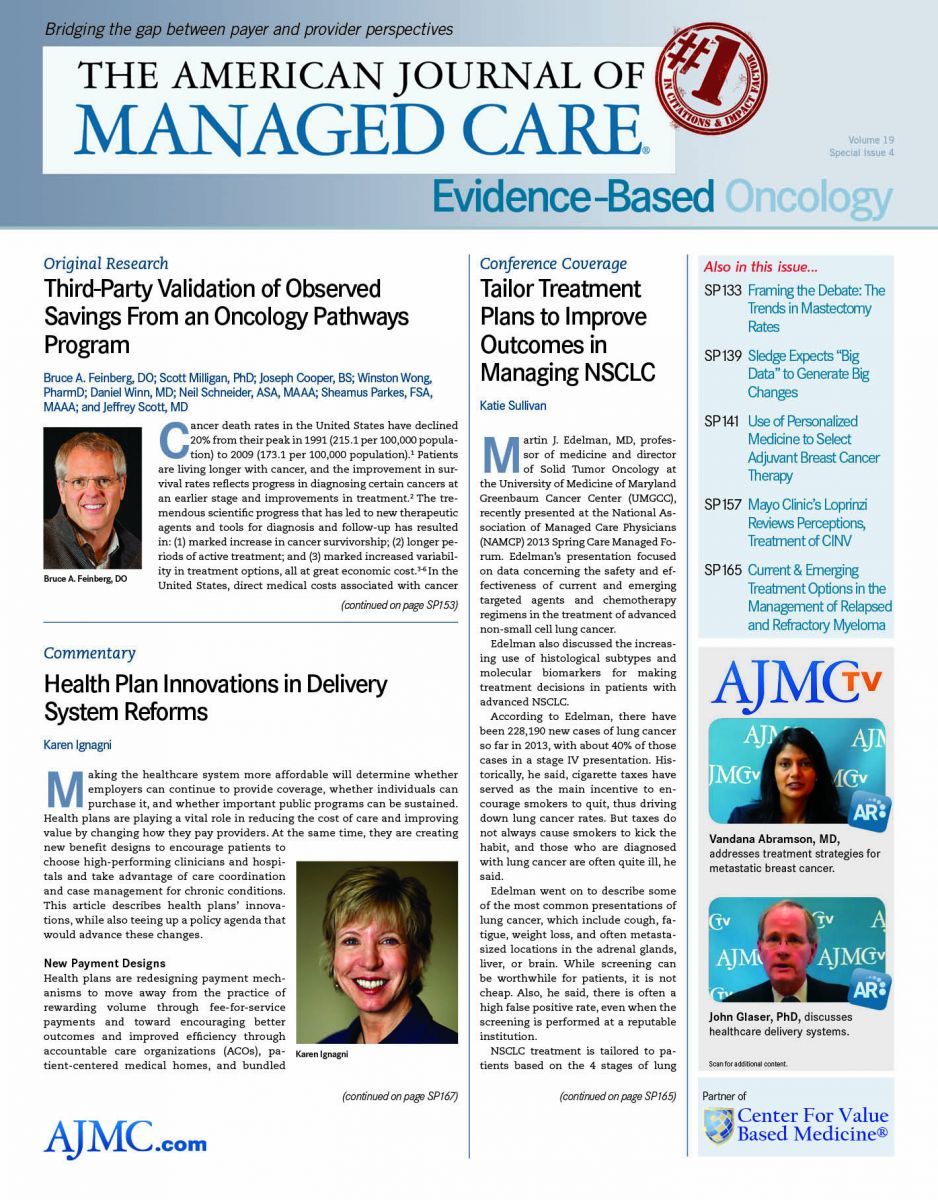- Center on Health Equity & Access
- Clinical
- Health Care Cost
- Health Care Delivery
- Insurance
- Policy
- Technology
- Value-Based Care
Tailor Treatment Plans to Improve Outcomes in Managing NSCLC
Martin J. Edelman, MD, professor of medicine and director of Solid Tumor Oncology at the University of Medicine of Maryland Greenbaum Cancer Center (UMGCC), recently presented at the National Association of Managed Care Physicians (NAMCP) 2013 Spring Care Managed Forum. Edelman’s presentation focused on data concerning the safety and effectiveness of current and emerging targeted agents and chemotherapy regimens in the treatment of advanced non-small cell lung cancer.
Edelman also discussed the increasing use of histological subtypes and molecular biomarkers for making treatment decisions in patients with advanced NSCLC.
According to Edelman, there have been 228,190 new cases of lung cancer so far in 2013, with about 40% of those cases in a stage IV presentation. Historically, he said, cigarette taxes have served as the main incentive to encourage smokers to quit, thus driving down lung cancer rates. But taxes do not always cause smokers to kick the habit, and those who are diagnosed with lung cancer are often quite ill, he said.
Edelman went on to describe some of the most common presentations of lung cancer, which include cough, fatigue, weight loss, and often metastasized locations in the adrenal glands, liver, or brain. While screening can be worthwhile for patients, it is not cheap. Also, he said, there is often a high false positive rate, even when the screening is performed at a reputable institution.
NSCLC treatment is tailored to patients based on the 4 stages of lung NSCLC treatment cancer presentation. Stage I and II patients are often eligible for surgery, or radiotherapy such as stereotactic body radiation therapy (SBRT), if they are inoperable or borderline. In stage III, there is a superior outcome (cure rate) when using chemotherapy and radiotherapy together versus radiotherapy alone. In stage IV, the most severe of cases, patients are often prescribed systemic therapy or palliative radiation therapy (XRT). However, even with preventative screening, Dr Edelman said most patients are diagnosed with an advanced stage of lung cancer.
Edelman said that the first-line therapy for advanced NSCLC includes several chemotherapy and targeted agents including erlotinib, crizotinib, cisplatin, and carboplatin. Choice in treatment is based on several factors like histology, or mutation status—such as epidermal growth factor receptor mutations (EGFRs). Second-line therapy includes similar determining factors in treatment choice, in addition to consideration of a patient’s current organ function, prior cancer treatment, and molecular variables. Other concerns may include the patient’s age, although Edelman suggests the majority of patients with advanced NSCLC are older than 70 years, and age does not seem to affect response or survival with therapy.
The future direction of tailoring treatment plans for NSCLC will be a continually evolving practice. Many patients still do not respond to current treatment methods. Dr Edelman said several promising agents, like monoclonal antibodies and vascular endothelial growth factor (VEGF) receptor pathways, are currently under investigation for treatment use. Advanced NSCLC is a common and deadly disease. While there are several considerations, and a number of therapies in use, Dr Edelman said there is still a long way to go in finding the most effective treatments, and seeking incentives beyond tax increases to prevent smoking-related cases of lung cancer.

Quality of Life: The Pending Outcome in Idiopathic Pulmonary Fibrosis
February 6th 2026Because evidence gaps in idiopathic pulmonary fibrosis research hinder demonstration of antifibrotic therapies’ impact on patient quality of life (QOL), integrating validated health-related QOL measures into trials is urgently needed.
Read More
Exploring Racial, Ethnic Disparities in Cancer Care Prior Authorization Decisions
October 24th 2024On this episode of Managed Care Cast, we're talking with the author of a study published in the October 2024 issue of The American Journal of Managed Care® that explored prior authorization decisions in cancer care by race and ethnicity for commercially insured patients.
Listen
Building Trust: Public Priorities for Health Care AI Labeling
January 27th 2026A Michigan-based deliberative study found strong public support for patient-informed artificial intelligence (AI) labeling in health care, emphasizing transparency, privacy, equity, and safety to build trust.
Read More

